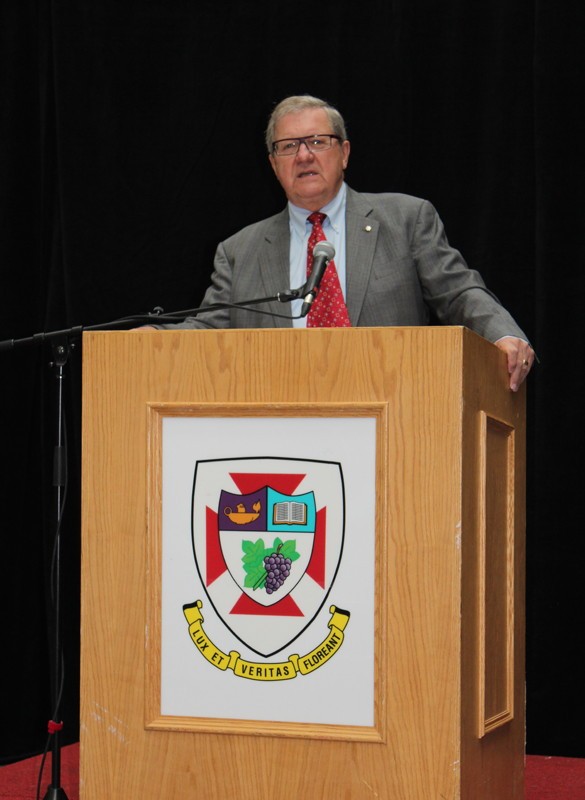‘The commodification of education’
U of W’s strategic review process under fire
The University of Winnipeg is facing criticism over the structure and mandate of its strategic review process.
Dr. Pauline Pearson, president of the University of Winnipeg Faculty Association, is calling for more meaningful accountability, transparency, and democracy in the strategic review process, including the immediate release of consultation submissions so faculty and students can see whose voices are being heard.
“We want a real, open, and transparent consultation process,” she said.
“We are very concerned our roles are being redefined and we are going to have to become fundraisers for the university rather than just be educators and researchers.”
On Sept. 13, the university announced it was changing its strategic review process to include faculty-based consultations.
“Each faculty will be tasked with considering how it can generate revenue it will keep internally,” said university president Dr. Lloyd Axworthy said in an interview with The Uniter last week.
The change comes on the heels of Axworthy’s state of the university address on Sept. 7, outlining four of the university’s key objectives, which include a move towards innovative online learning and a more entrepreneurial approach to funding.
Many of the university’s decisions and objectives have been made with budget pressures in mind, Axworthy said.
Pearson says there are too many review, objective setting, and consultation processes occurring simultaneously. Further complicating the review process are results obtained from Jonathan Fanton, an advocate of online learning strategies.
Fanton was a former colleague of Axworthy’s at the Macarthur Foundation, which provided the start-up grant for awarding and creating the Masters in Development Practice in Indigenous Development, a program that utilizes significant online learning. Fanton is also the former President of the New School for Social Research a leader in community engagement.
Pearson is concerned over how the separate consultation processes were intended to interact. It appears Axworthy’s objectives and the Fanton consultations might be shifting the nature of the strategic review process, she said.
“From the beginning, the process has been constrained by administration,” Pearson said.
“They set the goals for us and they continue to. We want far more meaningful participation.”
Laura Sexsmith, vice-president of student services for the University of Winnipeg Students’ Association (UWSA), echoed Pearson’s call for the disclosure of consultation submissions.
“ We are very concerned our roles are being redefined and we are going to have to become fundraisers for the university rather than just be educators and researchers.
Dr. Pauline Pearson, president, University of Winnipeg Faculty Association
Sexsmith added that the discussion of post-secondary funding concerns should not be lost in the pursuit of revenue creation. “The move towards faculties being encouraged to develop revenue generating projects, whether a fair idea or not, is a symptom of the larger issue of underfunding post-secondary education in this province,” she said.
Lauren Bosc, President of the UWSA, was concerned that Axworthy’s objectives outlined in his speech were not approved by the Executive of the Board of Regents, nor the entire Board of Regents. Instead they were approved by only the Officers of the Board of Regents.
This body has no student, faculty, or support staff representation on it.
Dr. Ian Angus, a humanities professor from Simon Fraser University and expert on the commercialization of education, noted faculty-generated revenue is part of a larger economic shift in universities.
“The commodification of education, in the sense of commercialization of research, is a danger to the social sciences and humanities,” he said.
“It can create a hierarchy of faculties based on the dictates of the market rather than based on the public good.”
These developments go hand in hand with the people imagining the student as a client or product, a trend that has developed over the last 30 years, Angus warned.
“What other client has to do so much work and be graded on it?” he said.
“University doesn’t fit the contractual model well.”
As universities become more tied to the market and cost cutting, they begin to degrade the quality of teaching, Angus said.
“PowerPoint and standardized learning are all forms of passive education that eliminate the student as a shaper of their own education,” he said.
“The student becomes a product for others not someone prepared to engage critically for themselves.”
The University of Winnipeg released the consultations submissions online on Tuesday Sept. 25 2012, after these interviews were conducted.
Published in Volume 67, Number 4 of The Uniter (September 26, 2012)







